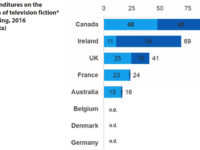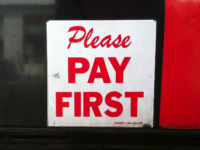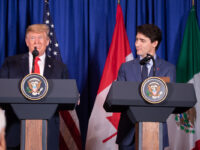The long awaited CRTC review into wireless services kicks off this week with virtually every key stakeholder – the big carriers, regional carriers, independent carriers, consumer groups, and many others – making their way to Gatineau to set out their vision for the future of wireless services in Canada. Elliot Noss, the CEO of Tucows, owns Ting, an MVNO that has carved out a niche in the U.S. market, but does not offer service in Canada as the big carriers won’t play ball. Elliot joins the podcast in advance of the CRTC hearing to discuss the state of Canadian wireless market, the role of MVNOs, and what he thinks needs to happen in Canada to make pricing more competitive.
Latest Posts
Broadcast Panel Commissioned Report Found Canada Ranks First Among Peer Countries in Spending on TV Production, Domestic TV Production, and Employment Per Capita
The Broadcast and Telecommunications Legislative Review Panel report calls for a massive overhaul of Canadian communications law – leading to increased consumer costs, violations of net neutrality, news regulation, CRTC intervention into discoverability, and USMCA violations – due in large measure to concerns about support for the creation of Canadian content. While the data confirms fears about the Canadian film and television sector have been overblown with record setting production in Canada, the panel insists that measures are needed to preserve Canadian jobs.
Yet what the panel did not disclose – in either its report or subsequent comments – are the results of benchmarking research on the Canadian television production sector it commissioned from Nordicity. That report was made available yesterday to those who asked (all the commissioned research can be requested from panel secretariat) and it reveals that Canada ranks first among peer countries with respect to expenditures on television production per capita, expenditures on domestic television production (ie. Cancon or equivalent domestic production) per capita, hours of television production per capita, and employment in film and television production per per capita. In other words, the panel had data that Canada spends more on television production, produces more hours of television programs, and employs more people per capita in the film and television sector than peer countries yet said nothing about the findings in its report.
The BTLR and USMCA, Part Two: Why the Broadcast Panel Recommendations Could Cost Canadians Millions in Retaliatory Tariffs
My review of the Broadcast and Telecommunications Legislative Review Panel report (previous posts include an overview of concerns, news regulation, Guilbeault’s comments, net neutrality, discoverability claims, consumer costs, potential USMCA violations, and a podcast debate with panel chair Janet Yale) continues with an analysis of why the recommendations could cost Canadians millions of dollars in retaliatory tariffs. In fact, while the panel seemingly envisions free money with payments from thousands of Internet sites and services from around the world to pay for Canadian content, broadband funds, and news organizations, the reality is that the proposals could result in the U.S. being entitled to levy massive tariffs against Canadian products ranging from dairy products to steel. In other words, the real costs would ultimately shift to farmers, manufacturing workers, and many others with no connection to the cultural sector.
The BTLR and USMCA, Part One: Why the Broadcast Panel Recommendations Conflict With Canada’s Emerging Trade Obligations
Since the release of the Broadcast and Telecommunications Legislative Review Panel report late last month, I’ve posted on several key issues including an overview of concerns, news regulation, Canadian Heritage Minister Guilbeault’s comments, net neutrality, discoverability claims, consumer costs, and a podcast debate with panel chair Janet Yale. The blog now shifts for the next two days on trade-related concerns arising from the report’s recommendations. This issue is particularly timely since the House of Commons has been debating Bill C-4, the implementation bill for the US-Canada-Mexico (USMCA) Trade Agreement and the government had made treaty implementation one of its top legislative priorities.
Higher Costs and Less Choice: Why Consumers Will Pay the Price for the Broadcast Panel’s Plans to Increase Costs of Internet Services and Sites
In the months leading up to the release of the Broadcast and Telecommunications Legislative Review Panel report, there was considerable focus on whether it would recommend a “Netflix tax”, a catch-all term that has come to mean digital sales taxes, corporate taxes, and mandated contributions to support the production of Canadian content. The report contains a curious paragraph in its overview in which it claims that the panel is not recommending a Netflix tax. It states:
We want to be clear that we are not recommending that Canadian content be supported by the so-called ‘Netflix Tax’ – charging consumers an extra levy on subscriptions to such services as Netflix. It is more appropriate to establish a regime that requires such online streaming services that benefit from operating in Canada to invest in Canadian programming that they believe will attract and appeal to Canadians. This approach would ensure a meaningful contribution to Canadian cultural policy objectives and the production sector. It need not result in higher prices for consumers.
The reference to a Netflix tax in the overview is the only such reference in the 235 page report. It was likely included in the overview in the hope that media coverage would jump on the claim and seek to re-assure Canadians that there was no Netflix tax or higher prices likely for consumers as a result of the report’s recommendations.
Yet the reality for anyone that reads beyond the overview is that the panel’s report not only recommends what would widely be considered a Netflix tax but proposes perhaps the biggest Internet cash grab in the OECD with mandated payments and levies on thousands of Internet services with Canadian users.











